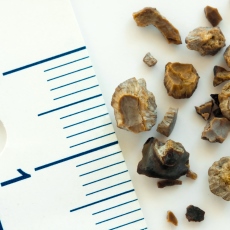
Kidney Stones
Also called: Nephrolithiasis
National Institutes of Health
Other Languages
New on the MedlinePlus Kidney Stones page:
07/25/2018 01:54 PM EDT
Source: National Library of Medicine - 

A kidney stone is a solid piece of material that forms in the kidney from substances in the urine. It may be as small as a grain of sand or as large as a pearl. Most kidney stones pass out of the body without help from a doctor. But sometimes a stone will not go away. It may get stuck in the urinary tract, block the flow of urine and cause great pain.
The following may be signs of kidney stones that need a doctor's help:
- Extreme pain in your back or side that will not go away
- Blood in your urine
- Fever and chills
- Vomiting
- Urine that smells bad or looks cloudy
- A burning feeling when you urinate
Your doctor will diagnose a kidney stone with urine, blood, and imaging tests.
If you have a stone that won't pass on its own, you may need treatment. It can be done with shock waves; with a scope inserted through the tube that carries urine out of the body, called the urethra; or with surgery.
NIH: National Institute of Diabetes and Digestive and Kidney Diseases
- Do You Have Symptoms of a Kidney Stone? (National Kidney Foundation)
- Abdominal Pain (Stomach Pain), Short-Term (American Academy of Family Physicians)Also in Spanish
- Crystals in Urine
 (National Library of Medicine)Also in Spanish
(National Library of Medicine)Also in Spanish  Kidney Stone Analysis
Kidney Stone Analysis  (National Library of Medicine)Also in Spanish
(National Library of Medicine)Also in Spanish- Kidney Tests: MedlinePlus Health Topic
 (National Library of Medicine)Also in Spanish
(National Library of Medicine)Also in Spanish  Phosphate in Urine
Phosphate in Urine  (National Library of Medicine)Also in Spanish
(National Library of Medicine)Also in Spanish- Uric Acid Test (American Association for Clinical Chemistry)
- Urography (American College of Radiology, Radiological Society of North America)Also in Spanish
- Lithotripsy (National Kidney Foundation)
- Percutaneous Nephrolithotomy/Nephrolithotripsy (National Kidney Foundation)
- Ureteroscopy (National Kidney Foundation)
- Diet and Kidney Stones (National Kidney Foundation)Also in Spanish
- Diet for Kidney Stone Prevention
 (National Institute of Diabetes and Digestive and Kidney Diseases)
(National Institute of Diabetes and Digestive and Kidney Diseases)
- Hyperoxaluria (Oxalosis and Hyperoxaluria Foundation)
- Genetics Home Reference: cystinuria
 (National Library of Medicine)
(National Library of Medicine) - Genetics Home Reference: hereditary xanthinuria
 (National Library of Medicine)
(National Library of Medicine) - Genetics Home Reference: primary hyperoxaluria
 (National Library of Medicine)
(National Library of Medicine)
- Kidney stones
 (Medical Encyclopedia)Also in Spanish
(Medical Encyclopedia)Also in Spanish
- Kidney Disease Statistics for the United States
 (National Institute of Diabetes and Digestive and Kidney Diseases)
(National Institute of Diabetes and Digestive and Kidney Diseases)
- ClinicalTrials.gov: Nephrolithiasis
 (National Institutes of Health)
(National Institutes of Health)
- Kidneys and How They Work
 (National Institute of Diabetes and Digestive and Kidney Diseases)Also in Spanish
(National Institute of Diabetes and Digestive and Kidney Diseases)Also in Spanish - Kidneys and Urinary Tract (For Parents) (Nemours Foundation)Also in Spanish
- Find a Urologist (Urology Care Foundation)
- National Institute of Diabetes and Digestive and Kidney Diseases

- National Kidney Foundation
- Blood in the Urine (Hematuria) (For Parents) (Nemours Foundation)Also in Spanish
- Kidney Stones in Children
 (National Kidney and Urologic Diseases Information Clearinghouse)
(National Kidney and Urologic Diseases Information Clearinghouse) - Kidney Stones in Children (Beyond the Basics) (UpToDate)
- Kidney Stones in Children and Teens (American Academy of Pediatrics)Also in Spanish
- Ultrasound: Renal (Kidneys, Ureters, Bladder) (For Parents) (Nemours Foundation)
- Kidney Stones (For Parents) (Nemours Foundation)Also in Spanish
- Kidney stones (Medical Encyclopedia)Also in Spanish
- Kidney stones - lithotripsy - discharge (Medical Encyclopedia)Also in Spanish
- Kidney stones - self-care (Medical Encyclopedia)Also in Spanish
- Lithotripsy (Medical Encyclopedia)Also in Spanish
- Ureteroscopy (Medical Encyclopedia)Also in Spanish


































No hay comentarios:
Publicar un comentario